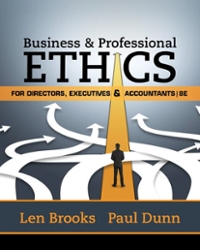The leak of the Panama Papers in 2016 revealed the existence of hundreds of thousands of offshore
Question:
The leak of the Panama Papers in 2016 revealed the existence of hundreds of thousands of offshore shell companies used by the world’s wealthy to avoid paying taxes, raised the public’s awareness of advantaged treatment of the wealthy, and led to renewed concerns about unfair tax practices. But the Panama Papers revelations were not the start of such concerns.
Earlier, KPMG admitted that for an average fee of \($10,000\). it put twenty-seven wealthy Canadians into tax avoidance shelters on the Isle of Man that cost the Canadian government millions of dollars.
Moreover, KPMG fought a court order requesting the names of these investors.
As a result, on May 1, 2015, the Canada Revenue Agency (CRA) offered a tax amnesty to those tax dodgers if they paid the taxes that they avoided by investing in the Isle of Man tax shelters. There would be no fines or penalties imposed on those who used this amnesty program. It was later revealed that, since 2010, CRA executives and officials had been wined and dined at various events sponsored by the tax policy committees of the Canadian accounting profession. In 2014 and 2015, the CRA officials who were offering the tax amnesty packages to the KPMG clients were entertained at the prestigious Rideau Club in Ottawa, along with personnel from KPMG.
KPMG was criticized on two different levels. Some were outraged at the optics of having KPMG entertain the government officials who are responsible for tax collection.
Duff Conacher of Democracy Watch suggested that there was a conflict of interest having CRA enforcement personnel attend a private reception sponsored and paid for by the accountants who CRA are responsible for regulating, auditing, and, if need be, penalizing. CRA assistant commissioner Ted Gallivan defended having his staff attend these functions on the basis that
“We... are trying to be responsive to the citizens that we serve, which includes large accounting firms. I don’t think it’s a problem.” KPMG partner Gregory Wiebe doubted that CRA officials could be influenced so easily. “I’ve been in this business for over thirty years and I’ve met a lot of people from CRA, and I can’t imagine that a beer and a piece of cheese would impact their integrity in one way whatsoever.”
Others argue that having tax accountants intentionally look for inadvertent gaps and ambiguities in the Income Tax Act is inconsistent with the objective of the profession to promote the public interest, especially when tax accountants, better than most people, understand why the government writes laws to prohibit tax havens.
The argument is that tax accountants are violating the spirit of the law when they purposefully look for loopholes in the laws prohibiting tax havens in order to have their wealthy clients invest in those tax havens, and that this does not promote the public interest. In response to this line of criticism, KPMG partner Wiebe’s defense, before a Canadian parliamentary hearing on tax evasion and avoidance, was that the accounting firm did nothing wrong because these tax shelters, although socially unacceptable like smoking in restaurants, were not technically illegal.
Questions:-
1. Are offshore tax havens that are technically legal but socially unacceptable in the public interest?
2. Are tax accountants promoting the public interest when they design, promote, and sell tax shelters that reduce or eliminate paying taxes by the wealthiest members of society?
3. Is there a difference between tax planning strategies that use legally sanctioned shelters, such as retirement savings accounts, different from tax planning strategies that use questionable offshore tax havens?
4. Do you think that government tax enforcement officers should or should not socialize with tax policy committees of the accounting profession and/
or directly with practitioners?
Step by Step Answer:

Business And Professional Ethics
ISBN: 9781337514460
8th Edition
Authors: Leonard J Brooks, Paul Dunn





